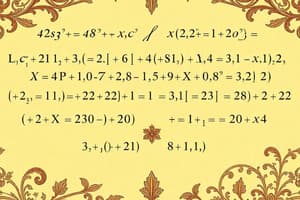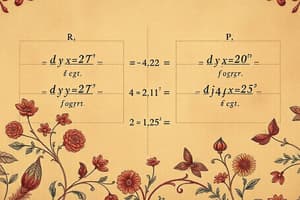Podcast
Questions and Answers
Which of the following equations is NOT a quadratic equation?
Which of the following equations is NOT a quadratic equation?
- $9x - 2 = 0$ (correct)
- $x^2 + 4 = 0$
- $2x^2 - 5x = 0$
- $5x^2 - 3x + 7 = 0$
In the quadratic equation $7x^2 - 9x + 2 = 0$, what are the values of a, b, and c, respectively?
In the quadratic equation $7x^2 - 9x + 2 = 0$, what are the values of a, b, and c, respectively?
- a = 7, b = 9, c = 2
- a = -7, b = -9, c = 2
- a = 7, b = -9, c = -2
- a = 7, b = -9, c = 2 (correct)
Which term is missing in the quadratic equation $4x^2 - 16 = 0$?
Which term is missing in the quadratic equation $4x^2 - 16 = 0$?
- Constant term
- All terms are present
- Quadratic term
- Linear term (correct)
Rewrite the equation $3x^2 + 5x = 8$ in standard form and identify the values of a, b, and c.
Rewrite the equation $3x^2 + 5x = 8$ in standard form and identify the values of a, b, and c.
Given the equation $-2x^2 + 6x - 4 = 0$, what is the standard form of the equation after ensuring 'a' is positive?
Given the equation $-2x^2 + 6x - 4 = 0$, what is the standard form of the equation after ensuring 'a' is positive?
Which of the following is the standard form of the equation $5x(x - 3) = 15$?
Which of the following is the standard form of the equation $5x(x - 3) = 15$?
What are the values of a, b, and c in the standard form of the expanded equation $(x + 4)(x - 2) = 5$?
What are the values of a, b, and c in the standard form of the expanded equation $(x + 4)(x - 2) = 5$?
If $a = 0$ in the general quadratic equation $ax^2 + bx + c = 0$, what type of equation does it become?
If $a = 0$ in the general quadratic equation $ax^2 + bx + c = 0$, what type of equation does it become?
Which of the following modifications will NOT change the nature of a quadratic equation?
Which of the following modifications will NOT change the nature of a quadratic equation?
Which of the following equations, when simplified and written in standard form, has $a = 5$, $b = -3$, and $c = 0$?
Which of the following equations, when simplified and written in standard form, has $a = 5$, $b = -3$, and $c = 0$?
If a quadratic equation is given as $x^2 + kx + 9 = 0$ and $k = 0$, what is a, b, and c?
If a quadratic equation is given as $x^2 + kx + 9 = 0$ and $k = 0$, what is a, b, and c?
Determine a, b, and c for the quadratic equation: $2x(x+3) = -4x + 7$
Determine a, b, and c for the quadratic equation: $2x(x+3) = -4x + 7$
Identify a, b, and c in standard form: $(4x - 3)(x + 2) = 3(x - 1)$
Identify a, b, and c in standard form: $(4x - 3)(x + 2) = 3(x - 1)$
After expressing the equation in standard form, which equation has a = 7, b = -1/3, and c = 0?
After expressing the equation in standard form, which equation has a = 7, b = -1/3, and c = 0?
What type of equation is described by 3x + 5 = 0?
What type of equation is described by 3x + 5 = 0?
What values of a, b, and c describe the following equation: $-x^2 + 5x = 10$?
What values of a, b, and c describe the following equation: $-x^2 + 5x = 10$?
What equation represents a quadratic equation where a = 4, b = 0, and c = -25?
What equation represents a quadratic equation where a = 4, b = 0, and c = -25?
What adjustment should be made to ensure positive values for 'a' in the equation $-3x^2 + 6x - 9 = 0$?
What adjustment should be made to ensure positive values for 'a' in the equation $-3x^2 + 6x - 9 = 0$?
What makes the equation a quadratic equation?
What makes the equation a quadratic equation?
How does expanding $4x^2 + 8x - 12 = 0$ by a factor of two affect its values?
How does expanding $4x^2 + 8x - 12 = 0$ by a factor of two affect its values?
Flashcards
Quadratic Equation
Quadratic Equation
A mathematical sentence of the second degree (highest exponent of the variable is 2).
Standard Form
Standard Form
The standard form of a quadratic equation is ax² + bx + c = 0, where a, b, and c are real numbers and a ≠ 0.
Quadratic Term
Quadratic Term
The term 'ax²' in the standard form of a quadratic equation (ax² + bx + c = 0).
Linear Term
Linear Term
Signup and view all the flashcards
Constant Term
Constant Term
Signup and view all the flashcards
Identifying a, b, and c
Identifying a, b, and c
Signup and view all the flashcards
Write in Standard Form
Write in Standard Form
Signup and view all the flashcards
Positive 'a' Value
Positive 'a' Value
Signup and view all the flashcards
Expanding Expressions
Expanding Expressions
Signup and view all the flashcards
Defining Characteristic
Defining Characteristic
Signup and view all the flashcards
Study Notes
Quadratic Equations
- A quadratic equation in one variable is a mathematical sentence of the second degree.
- Second degree indicates that the highest exponent of the variable is 2.
- Quadratic equations can be written in standard form: ax² + bx + c = 0.
- a, b, and c are real numbers.
- a should not be equal to zero.
- a should be a positive real number.
Parts of a Quadratic Equation (in standard form)
- ax² is the quadratic term.
- bx is the linear term.
- c is the constant term.
Identifying a, b, and c in a Quadratic Equation
- Arrange the equation into standard form first
- Example: x² - 5x + 3 = 0
- a = 1 (numerical coefficient of x² is 1)
- b = -5
- c = 3
- Example: 9r² - 25 = 0
- a = 9
- b = 0 (missing linear term)
- c = -25
Writing a Quadratic Equation in Standard Form
- Start with a quadratic equation in the form ax² + bx + c = 0
- Example: x² + x = 4
- Rewrite as: x² + x - 4 = 0
- a = 1, b = 1, c = -4
- Example: 7x² = ⅓x
- Rewrite as: 7x² - ⅓x = 0
- a = 7, b = -⅓, c = 0
- Example: 6x² = 9
- Rewrite as: 6x² - 9 = 0
- a = 6, b = 0, c = -9
- If 'a' is negative, multiply or divide the entire equation by -1 to make 'a' positive
- Example: -8x² + x = 6
- Rewrite as: -8x² + x - 6 = 0
- Multiply by -1: 8x² - x + 6 = 0
- a = 8, b = -1, c = 6
Special Cases and Twists
- Example: 3x(x - 2) = 10
- Expand: 3x² - 6x = 10
- Rewrite in standard form: 3x² - 6x - 10 = 0
- a = 3, b = -6, c = -10
- Example: (2x + 5)(x - 1) = 6 (product of two binomials)
- Expand: 2x² - 2x + 5x - 5 = 6
- Simplify: 2x² + 3x - 5 = 6
- Rewrite in standard form: 2x² + 3x - 5 - 6 = 0
- Combine constants: 2x² + 3x + 1 = 0
- a = 2, b = 3, c = 1
Key Considerations
- If a = 0, the equation is not quadratic (it becomes a linear equation).
- If b = 0, the equation is still quadratic as long as 'a' and 'c' exist.
- If c = 0, the equation is still quadratic as long as 'a' exists.
- The defining characteristic of a quadratic equation is the presence of a second-degree exponent.
Studying That Suits You
Use AI to generate personalized quizzes and flashcards to suit your learning preferences.



